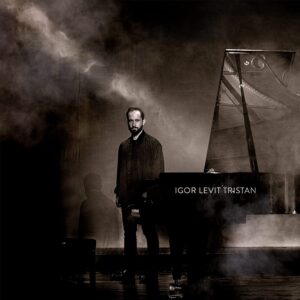Igor Levit is one of the few pianists around (perhaps the only one) whose provocative thematic program concepts yield equally stimulating and substantial musical results. Rather than delve into philosophical and musical connections between the works presented on “Tristan”, I’ll talk about the music and the performances.
For Disc 1’s curtain raiser Levit removes decades worth of treacly build-up and interpretive kitsch from Liszt’s Liebestraum No. 3 in a brisk and unsentimental performance that illuminates the work’s art song origin. What do we make of Henze’s Tristan, a six-movement work subtitled “Preludes for Piano, Tapes and Orchestra”, nearly a half century after its premiere? Some parts statically and quietly meander, others generate loud fury and brilliant flourishes of concertante-like scoring, such as the second movement’s deatché piano episodes supported by cloudy string chords. The fourth movement alternates between sections of rapid atonal generic “bloop bleep” gestures, stentorian brass pronouncements, long string melodies, and allusions to the Brahms First symphony’s pounding introduction.
Levit’s secure and suavely shaped handling of the piano part sets new standards in this work. The engineering captures the complexities and dynamic extremes of Henze’s scoring with concert hall realism, allowing Welser-Möst’s skillful balancing of the Gewandhaus forces to fully register. That said, I slightly prefer the closer microphone placement and incisive detailing in the world-premiere recording featuring pianist Homero Francesch, with the composer conducting the Cologne Radio Symphony Orchestra.
Levit plays Zoltan Kocsis’ transcription of Wagner’s Tristan und Isolde Act 1 Prelude more deliberately than either Kocsis or Severin von Eckerardstein, and is not afraid to blur the pedal to sustain tension. The Prelude’s soft ending assiduously dovetails into Ronald Stevenson’s piano edition of the Adagio from Mahler’s Tenth symphony. Clocking in at nearly 28 minutes, Levit’s interpretation is considerably slower and far more harrowing than in Christopher White’s recording, as he wrings every drop of harmonic intensity from Mahler’s counterpoint. Even without an orchestra, that famous climactic nine-note chord will send you running for cover. In this context, Liszt’s Harmonies du Soir represents pure decompression. Here Levit’s ingenuous pedaling and freshly minted phrasings minimize sentiment and bombast, and manage to make Liszt sound more modern than Henze! Self-recommending.
































